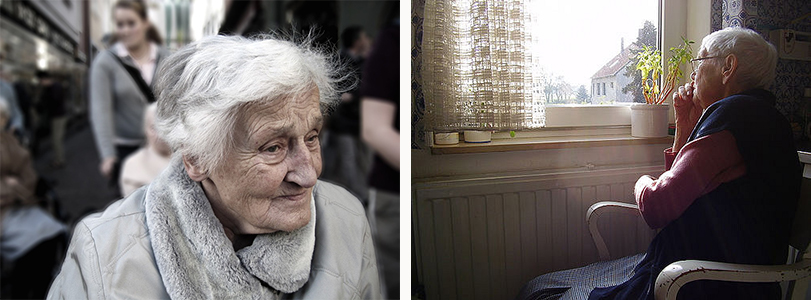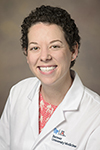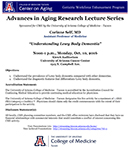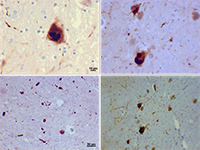
Lewy bodies are tiny protein deposits in the brain named after a German doctor who first identified them. Researchers don't have a full understanding of why they appear, or how they contribute to dementia. They have linked them to low levels of important chemicals (acetylcholine and dopamine) that carry messages between nerve cells.
 UA Assistant Professor of Medicine Corrine Self, MD, will present on “Understanding Lewy Body Dementia” at the next talk in the Advances in Aging Lecture Series to be given Monday, Oct. 10, noon-1 p.m. in Kiewit Auditorium, 1515 N. Campbell Ave., Tucson.
UA Assistant Professor of Medicine Corrine Self, MD, will present on “Understanding Lewy Body Dementia” at the next talk in the Advances in Aging Lecture Series to be given Monday, Oct. 10, noon-1 p.m. in Kiewit Auditorium, 1515 N. Campbell Ave., Tucson.
The Advances in Aging Lecture Series is hosted by the University of Arizona Center on Aging and UA Division of Geriatrics, General Internal Medicine and Palliative Medicine. In August, these lectures returned to the UA Health Sciences campus from the Behavioral Health Pavilion at Banner – University Medical Center South, which hosted them for the past four years. They are free and open to the public—and a light lunch is served to attendees.
For more details about this lecture—including Continuing Medical Education (CME) credits available to health-care professionals, ![]() click here [PDF] or on the image at left to download and share the flyer.
click here [PDF] or on the image at left to download and share the flyer.
Dr. Self’s presentation can be viewed Live! online on Oct. 10. You can also view archived presentations in the Advancing in Aging Lectures about one week following the live event.
WHAT: Advances in Aging Lecture Series - “Understanding Lewy Body Dementia”
SPEAKER: Corinne Self, MD, UA Assistant Professor of Medicine
WHEN: Monday, Oct. 10, 2016
TIME: Noon-1 p.m. – includes a light lunch
WHERE: Kiewit Auditorium, UA Arizona Cancer Center, 1515 N. Campbell Ave.
What are LBDs?
 Lewy body dementias (LBD) are the second most common form of degenerative dementia, just behind Alzheimer’s Disease. LBD is an umbrella term for dementia associated with presence of Lewy bodies (abnormal deposits of a protein called alpha-synuclein) in the brain, according to the Lewy Body Dementia Association. It is not a rare disease. It affects an estimated 1.4 million U.S. individuals and their families. Since LBD symptoms can closely resemble more commonly known diseases like Alzheimer’s and Parkinson’s, it is currently widely underdiagnosed. Many doctors or other medical professionals still are not familiar with LBD, Dr. Self acknowledged.
Lewy body dementias (LBD) are the second most common form of degenerative dementia, just behind Alzheimer’s Disease. LBD is an umbrella term for dementia associated with presence of Lewy bodies (abnormal deposits of a protein called alpha-synuclein) in the brain, according to the Lewy Body Dementia Association. It is not a rare disease. It affects an estimated 1.4 million U.S. individuals and their families. Since LBD symptoms can closely resemble more commonly known diseases like Alzheimer’s and Parkinson’s, it is currently widely underdiagnosed. Many doctors or other medical professionals still are not familiar with LBD, Dr. Self acknowledged.
“Interestingly, this type of dementia does not affect memory to the same degree as Alzheimer's type dementia, so it often goes overlooked,” Dr. Self said. “It’s the visual spatial areas as well as organization and planning abilities that are affected. Like other forms of dementia, though, it does result in a gradual decline in cognitive abilities and independent function.”
More information on Lewy Body Dementia is available from the U.S. Centers for Disease Control & Prevention.
A geriatrician by training, Dr. Self joined the faculty in the UA Division of Geriatrics, General Internal Medicine and Palliative Medicine in the UA Department of Medicine this summer.
Previously, she earned her medical degree from the UA College of Medicine – Tucson and completed her residency in internal medicine here as well. She did her fellowship in geriatric medicine at the Stanford University School of Medicine’s Geriatric Research, Education and Clinical Center and the VA Palo Alto Health Care System in Palo Alto, Calif. She is board certified in both internal and geriatric medicine.
For Clinical Consultations
Dr. Self holds Geriatric Consultation Clinics on:
- Tuesday afternoons at the Adult Medicine Physician Offices (6OPC) at Banner – University Medical Center Tucson, 1501 N. Campbell Ave., and
- Thursday mornings at the Banner – UMC South Adult Health Services Clinic, 2800 E. Ajo Way (one-story building east of hospital’s main entrance).
To schedule a patient appointment with Dr. Self, you can call (520) 694-8888. If you’re a physician and would like to make a referral for her, please call Banner Physician Resources at (520) 694-5868 or toll-free 1-800-524-5928.
Dr. Self also does home visits with patients on Monday and Wednesday mornings. Screening and scheduling for these appointments are handled by Megan Padilla—megan.padilla@bannerhealth.com
To leave a message for Dr. Self, call (520) 694-4000.
About the UA Center on Aging
The mission of the University of Arizona Center on Aging (ACOA) at the UA College of Medicine – Tucson is to enable older adults to live healthy and functional lives through coordinated programs in research, education, outreach and patient care. Established in 1980 as one of a network of Long Term Care Gerontology Centers authorized by the Older Americans Act, the ACOA was approved by the Arizona Board of Regents as a Center of Excellence at the UA Health Sciences in 1991. It is affiliated with the Division of Geriatrics, General Internal Medicine and Palliative Medicine within the UA Department of Medicine. For more information, visit www.aging.arizona.edu
For questions or suggestions for the Advances in Aging Lectures, please contact Rachel Peterson, MA, MPH, a Senior Health Educator and CDC Healthy Brain Research Network Scholar, UA Center on Aging, (520) 626-5808 or rpeterson@aging.arizona.edu
ALSO SEE:
"‘Advances in Aging Lectures’ Return to Convenience of Central Tucson, Sept. 12" | Posted: Aug. 29, 2016

